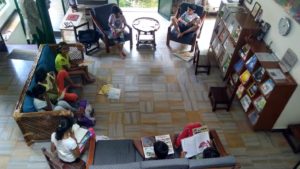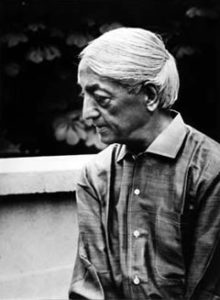The starting point of our educational thinking is that there is a crisis in human society at multiple levels: personal, political and environmental. Personal and social problems are mirrors of each other, and are intimately connected. In other words, human needs and desires have created the social structures we live in today, and any examination of these structures or any attempt to change them must at least begin with an examination of personal, “subjective” emotional patterns.
 Our basic questions are:
Our basic questions are:
Is there a different way of living, both in personal and in social terms, that is not conflict ridden but essentially peaceful and whole? What role does education have in this process?
In the context of these questions, our education encourages a deep learning, both from adults and children, into the nature of our daily lives and into the social processes that surround us. When we say “learning,” we don’t only mean academic or text-based learning but an inquiry into the complex daily process of life, thought and emotion.
This learning is by definition fluid and tentative, as it reflects the complexities of the realities that constitute our lives. Nevertheless, it has some basic features and focal points that reflect in our day and educational curricula:
Learning is about a quiet awareness of our conditioning, psychological states and daily habits. It does not mean a self-indulgent wallowing in emotion. Rather, it involves a critical alertness to our own emotional patterns and an ability to hold these lightly while relating with each other;
It is important to have spaces of solitary quiet to facilitate this process;
Awareness of nature and natural processes is an important aspect of learning;
This process of learning underlies all aspects of children’s and adults’ lives: academics, sport, family life, sexuality, religion, politics;
Learning can happen through open-ended and open-minded dialogue between individuals. The purpose of these dialogues is not to arrive at a “right” conclusion but to have insight into our conditioning; Learning is a process of skepticism and questioning;
It is important not to allow traditional structures of hierarchy and authority to come in the way of skepticism and questioning.
We feel that the most basic learning that can happen is regarding ourselves, our conditioning, the conflicts in our minds and the social expression they have, the nature of our hopes, desires, ambitions and frustrations, and about what it means to live a fundamentally deep and peaceful life. Our education is an exploration of these questions.
J Krishnamurti
 The work of J. Krishnamurti (1895-1986) has been of particular relevance to the teachers of the school both in their own lives and in their concerns about education. In his writings and talks to audiences all over the world, Krishnamurti emphasized the need for a fundamental transformation in human consciousness. The turmoil in our relationships and in the world is a reflection of our self-centredness and our confused attempts to escape pain and suffering. Without this transformation, he felt that there was no possibility of lasting peace and freedom for the individual or for society.
The work of J. Krishnamurti (1895-1986) has been of particular relevance to the teachers of the school both in their own lives and in their concerns about education. In his writings and talks to audiences all over the world, Krishnamurti emphasized the need for a fundamental transformation in human consciousness. The turmoil in our relationships and in the world is a reflection of our self-centredness and our confused attempts to escape pain and suffering. Without this transformation, he felt that there was no possibility of lasting peace and freedom for the individual or for society.
Krishnamurti was probably unique among seers in his unequivocal rejection of religious and spiritual authority. He refused to be cast as the guru, demanding instead that each one of us be “a light unto oneself”. He rejected method and practice, pointing out that these implied psychological time and a false sense of becoming. He spoke of the possibility of a choiceless awareness in the present that makes no effort to change or transform.
Krishnamurti felt that education has a central role to play in nurturing a living awareness in the student and the teacher. The Krishnamurti Foundations set up many schools in India, America, and the U.K. and the teachings have been the inspiration for many others over the decades.
The online repository of the teachings of J. Krishnamurti can be found at www.jkrishnamurti.org